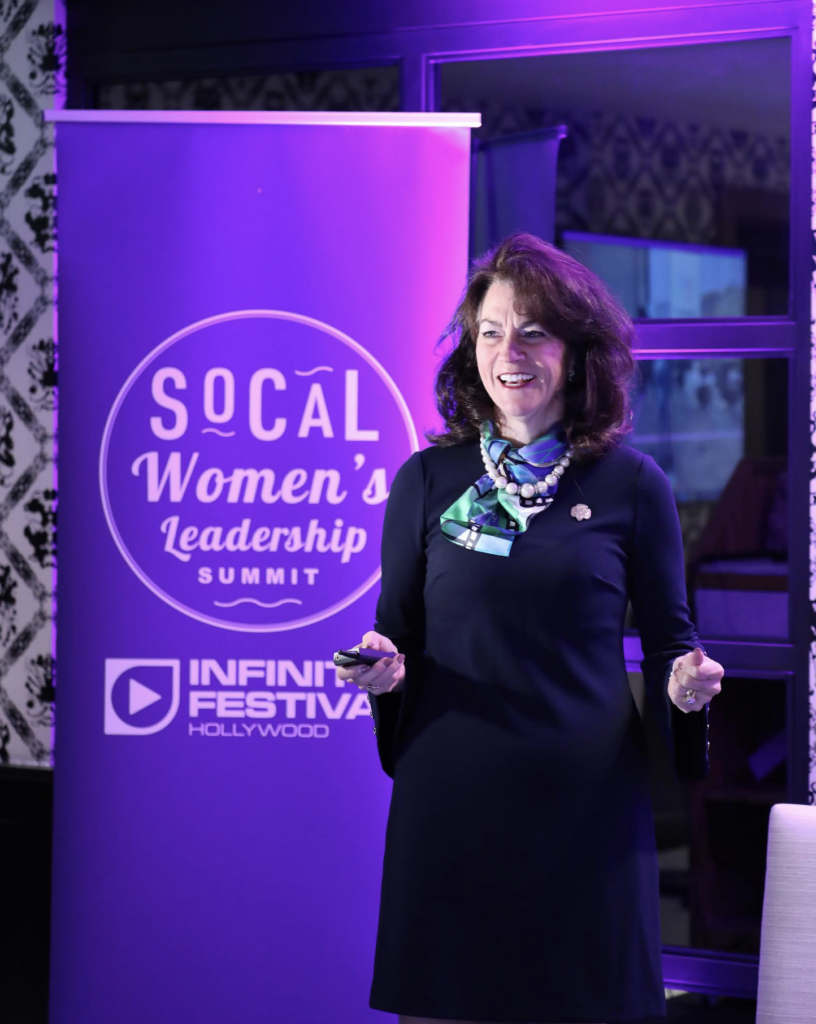
SoCal Women’s Keynote: Girl Scouts ‘More than Cookies and Camp’
Karen P. Layng, president of the board of directors for the Girl Scouts of USA, president and CEO of a consulting company, a C-suite executive, and a professor of engineering, knows what she’s talking about when it comes to the importance of young girls having a mentor as early as possible.
During her keynote address Nov. 4 at the SoCal Women’s Leadership Summit, Layng shared how, when she was a Girl Scout Brownie (ages 7-9) in Chicago, her first-ever mentor was her troop leader. “She was tough as nails. In the 60s she believed in equality for women on the battlefield and in the board room,” Layng said. “She stood up and told us ‘You have value.’”
Layng’s keynote — “Future Women Leaders in Tech Wear Green” — focused on how critical leadership development training in the Girl Scouts and other programs can be for young women, the earlier the better, because “the harsh reality is that by the time a girl graduates high school, she’s already behind,” she said. “Assigning a mentor at that point may only be window dressing.”
 Layng pointed to statistics showing that mentorship needs to start early, in kindergarten even, to help young women get even in the career race, and research shows those that join the Girl Scouts of the USA are offered the best leadership development experience, showing a demonstrable impact in being prepared for challenging careers.
Layng pointed to statistics showing that mentorship needs to start early, in kindergarten even, to help young women get even in the career race, and research shows those that join the Girl Scouts of the USA are offered the best leadership development experience, showing a demonstrable impact in being prepared for challenging careers.
In the past four years, Girl Scouts have earned more than 1.4 million STEM badges, and on average, almost 4,000 girls a year earn their Gold Awards — the Girl Scouts’ highest award — with many completing projects in STEM, Layng said. Girl Scouts learn everything from computational thinking to coding and app development to how to run and analyze a trace route.
Girl Scout Research Institute data shows that by creating opportunities for Girl Scouts to explore STEM and careers in technology, its programs reverse the trend of declining STEM interest in girls.
The organization provides girls the training, mentoring, and hands-on experiences to help them understand the import of STEM and tech careers and options for their own career paths.
The Girl Scouts have a measurable impact on the careers of women: more than 70 percent of women in the U.S. Senate were Girl Scouts, half of the women working for NASA were in the program, more than half of the women in the U.S. House of Representatives were Girl Scouts.
Women represent 47 percent of the workforce, but less than 30 percent of STEM jobs, and by 2025, the U.S. will need to fill 3.5 million STEM jobs, but with only one million qualified workers. The Girl Scouts, and mentorship programs offered by groups like those working with Women in Technology Hollywood, can help close those gaps.
A Girl Scout who completes just one STEM program found themselves more interested in doing more related activities, inside and outside the Girl Scouts.
“This trend must be disrupted,” Layng said of current STEM job statistics. “And it starts in kindergarten. We’ve learned that STEM programs in the Girl Scouts becomes a cumulative experience. We’re more than cookies and camp.”
The SoCal Women’s Leadership Summit was presented by Softtek, PacketFabric, Amazon Web Services, Cognizant, Deluxe, Expert.AI, FilmTrack, Google, KeyInfo, Los Angeles Duplication and Broadcasting, Method, and Premiere Digital. The event is produced by MESA in association with the Hollywood IT Society and Women in Technology Hollywood.
